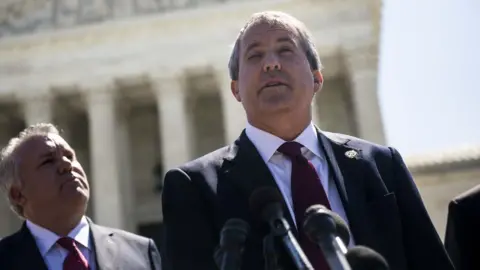Coronavirus: Texas says abortions 'non-essential' amid pandemic
 Getty Images
Getty ImagesAs US states ramp up restrictions to contain the coronavirus, Texas has joined Ohio in deeming nearly all abortions as non-essential procedures that must be delayed.
The order against elective procedures is meant to keep valuable medical resources for those treating Covid-19 only.
In Texas, providers can be fined or jailed for violating the order.
Abortion rights groups have criticised the move.
They say abortion should be considered an essential service.
It comes as states across the country grapple with shortages of critical medical necessities, including masks, hospital space and ventilators. Medical professionals have pleaded for more supplies as many are falling ill or having to quarantine themselves after exposure.
Texas Attorney General Ken Paxton on Monday issued the clarification of Governor Greg Abbot's earlier mandate on non-essential medical procedures.
A statement from Mr Paxton's office said "no one is exempt from the governor's executive order on medically unnecessary surgeries and procedures, including abortion providers", according to the Texas Tribune.
It noted any providers in violation of the order - which expires 21 April - could be fined $1,000 (£853) or jailed for a maximum of 180 days.
The Texas Freedom Network, an advocacy group, condemned the order, accusing the attorney general of trying to "push his ideological agenda" and highlighting the state's already restrictive policies regarding abortion.


- THE LATEST: Live updates
- A SIMPLE GUIDE: What are the symptoms?
- AVOIDING CONTACT: Should I self-isolate?
- STRESS: How to protect your mental health
- VIDEO: The 20-second hand wash

Abortions are banned after 20 weeks post-fertilisation in Texas and women must receive counselling about non-abortion options before obtaining the procedure.
Ohio is similarly restrictive and last year passed a bill banning abortion after six weeks, though the ban has been blocked in the courts. Texas politicians have also filed a similar ban.
Last week, US gynecology groups, including the American College of Obstetricians and Gynecologists, issued a joint statement calling for abortions to be protected during the crisis.
"It is also a time-sensitive service for which a delay of several weeks, or in some cases days, may increase the risks or potentially make it completely inaccessible," the statement said.
"The consequences of being unable to obtain an abortion profoundly impact a person's life, health, and well-being."
The provider groups also noted that most abortion care is not delivered in hospital settings.
Over the weekend, Ohio's Attorney General Dave Yost wrote to inform abortion clinics that they should stop all abortion services that require the use of medical protective equipment.
"If you or your facility do not immediately stop performing non-essential or elective surgical abortions in compliance with the order, the Department of Health will take all appropriate measures," a letter viewed by CBS News stated.
In response, the Planned Parenthood of Southwest Ohio clinic said it would comply with the order regarding personal protective gear, but would still be able to provide "essential procedures, including surgical abortion".
According to the New York Times, the letters from Ohio's government followed complaints to the health department from at least one anti-abortion group.
